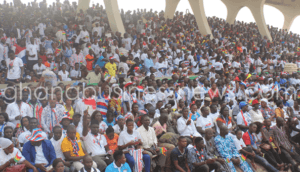Ghana government urged to prioritise reproductive rights to control population growth
 Mrs Florence Hagan, the Greater Accra Regional Population Officer, has urged the government to prioritise Reproductive Health Rights and Choices to control population growth in the country.
Mrs Florence Hagan, the Greater Accra Regional Population Officer, has urged the government to prioritise Reproductive Health Rights and Choices to control population growth in the country.
She said addressing reproductive health issues like family planning, early marriage and childbirth and teenage pregnancies would help achieve the Sustainable Development Goal three.
Mrs Hagan said population growth, especially in the Greater Accra Region had put a lot of pressure on the limited resources and infrastructure, which called for urgent action.
She said this in Accra at a press briefing to commemoration this year’s World Population Day (WPD) on the national theme: “Prioritizing rights and choices; harnessing opportunities, the road to a resilient future for all.”
The global theme for this year’s WPD: “A world of eight billion: towards a resilient future for all, harnessing opportunities and ensuring rights and choices,” seek to draw attention to the world population growth expected to hit about eight billion by the end of this year.
The global event is commemorated on July 11.
The 2021 Population Census revealed that Greater Accra population increased from 4,010,054 in 2010 to 5,455,692 in 202.
The figure makes Accra the most populous in Ghana, overtaking Ashanti region since 1970.
Greater Accra Region, she stated, was becoming overpopulated as a result of high level of in-migration from other regions and immigration from neighbouring countries, which needed urgent attention.
The 2014 Survey on Demographic and Health shows that the total fertility rate is 2.8 children per woman in the country.
Mrs Hagan said the fertility rate attested to that fact that the region’s youthful age structure was largely as a result of migration and urbanisation.
“We need to be concern about Ghana’s youthful population because they represent the economic workforce driving the economy,” she said.
She said Ghana achieving a demographic dividend required that the country understood the size and distribution of its population, its current and projected age structure and the pace of population growth.
The situation, she emphasised, meant national needs must be matched with a sequence of short, medium and long-term investments that guaranteed the rights of all the citizenry to enjoy access to sectors of development.
She called on relevant authorities to add their voices to promote policies, programmes and legislation to end child marriage, reduce teenage pregnancies and support evidence-based and girl-centred investments to empower them with information on their health rights.
Dr Farida Njelba Abdulai, the Acting Greater Accra Deputy Director, Public Health, Ghana Health Service, said as the world population got to eight billion, it was necessary to prioritise the number of children to have for proper care.
“As health service, we work to ensure that family planning services are safe, acceptable, affordable, effective and geographically accessible for all,” she said.
To improve financial access, she said the National Health Insurance Authority this year approved the use of the Authority’s card to access family planning services to increase the uptake of the services.
Some of the participants urged the leadership of the National Population Council to liaise with the religious leaders to educate the public on reproductive issues, especially with family planning.
Source: GNA
